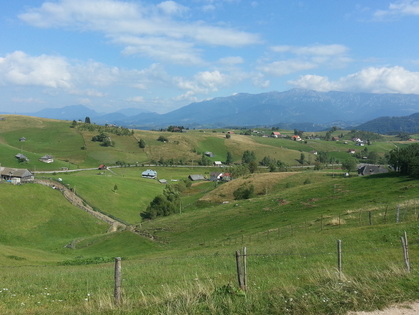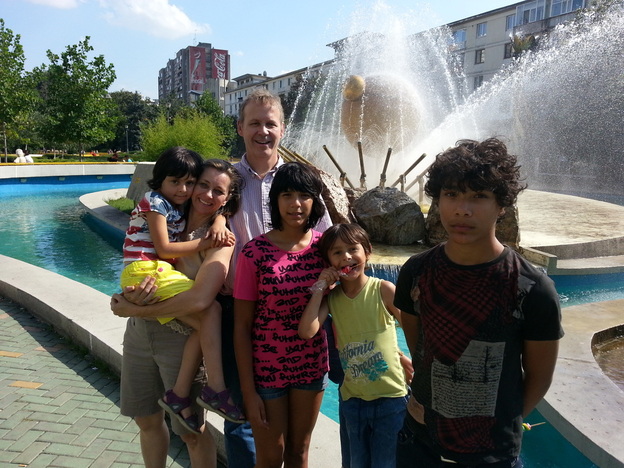 Being in Romania has been jarring in some ways. It would be less so if we could stay on the surface of it. For example, the weather has been a pleasant and lovely contrast to our last couple of weeks, where we hit a steak of cold and rain. Romanians are eager to assure us that it gets quite cold in winter, but it is currently basking in a delightful late-summer sunny stretch. The scenery has also been more beautiful than we could have imagined. It can seem almost idyllic as we drive through rolling green hills, passing horse-drawn carts on our way to a weekend retreat with a local church from the city of Pitesti. But then we start to hear the stories. Stories of almost unimaginable suffering under Communism, and of its ongoing legacy for the nation and the church. While many of the rulers who clawed their way to power in the Soviet-era were cruel and self-serving, Nicolae Ceausescu almost certainly takes the prize. Ruling from 1967 until his execution in 1989, he impoverished his nation with terribly misguided policies. Incredibly, he was inspired by a visit to North Korea, where he took a liking to the idea of a nation worshipping its leader, and implemented policies to further that goal. He had the grandiose vision of increasing the nation’s population by millions in a short span of years, and so declared any childless couple to be traitors of the state. He declared the fetus ‘the property of the society,’ and encouraged women to be pregnant as often as possible. Predictably, given food shortages and a lack of prenatal care, the infant mortality rate soared to 83 per 1000. (Just for comparison if you, like me, haven’t thought about infant mortality rates recently: developed nations like German, Austria and Australia hover around 4 per 1000 today; the very poorest nations in the world, like Mali, hit numbers in the low 80’s. http://data.worldbank.org/indicator/SP.DYN.IMRT.IN) Children born under a certain weight were declared miscarriages and denied treatment. As one Romanian doctor put it, “While banning abortion, he did nothing to promote life.” All agree that his policies were dreadful. But sadly, the pendulum has swung tragically far towards a culture of abortion. Abortion rates are the highest in the EU at 480 per 1000 births; some estimate that Romanian women in their twenties will have 10-20 abortions during that decade of their lives. Married couples are reproducing at troublingly low rates. Alex and Nati, the pastor couple who have hosted us this past week, had a striking insight. They dream of having an impact on their nation in this area, and as part of preparing for that, they have read numerous American debates online on the topic. They find them of little use because, they say, “In the US it seems to be all about the age at which a fetus is viable. Here no one quibbles about whether it is a life. They simply do not value life.” This last phrase has landed heavily in my heart. I too am passionately pro-life, though I am sensitive to the ways that Christians (and certain Congressmen who may or may not be Christian) in the US have entered the fray with rhetoric and protest methods that have been hurtful to women and not all constructive. I don’t want to be one ‘those’ pro-lifers. I want to be truly pro-life: life for women facing very difficult choices, life for men who face losses as well in those moments, and life for children, born and unborn. And I know that the issue is incredibly complex.  Alex and Nati's four adopted children: Krina, Alina, David and Kristi. Perhaps for our benefit, Krina is wearing an American flag shirt, and David's shirt reads "California Dream". Alex and Nati's four adopted children: Krina, Alina, David and Kristi. Perhaps for our benefit, Krina is wearing an American flag shirt, and David's shirt reads "California Dream". This is why I’m so inspired by the simple, sacrificial step I see Christians taking, everywhere we go in Eastern Europe. As we’ve tried to synthesize a few patterns from our brief visits to four nations, one profound trend we’re seeing is that Christians are treasuring children, with big, open hearts. Young couples are having children and caring for them well—in itself a prophetic act in a culture where children are seen as impediments to women getting the rights to careers that were denied them in previous generations. Many are taking in foster children, like the single mom we met who has six foster children and is working to adopt them all. IFES staff and the young generation of pastors emerging in Belarus, Latvia, and here in Romania are not just adopting, but adopting later in life after their biological children are well into their teens. They are adopting the toughest children to place, and they are adopting greater numbers of children than they had initially set out to adopt. Alex and Nati have adopted four children from the Roma culture, an ethnic group which is looked down upon here, sometimes cruelly. These four have endeared themselves to us hugely in our time in their home. They have little English, but we can say “Wow!” when they show us their artwork and new school backpacks, I can show them how to use a drawing app on my phone during a long car ride, and our hearts can break as we hear a little from their parents about the pasts they lived before coming here. I had not expected children to be such a big part of our adventure this year, but I am so delighted that it is. As God continues to enlarge our own hearts to welcome children, we hope God will show us how to be truly pro-life in our local context throughout our lives.
0 Comments
Leave a Reply. |
Archives
April 2024
AuthorRich and Lisa Lamb Categories |
 RSS Feed
RSS Feed